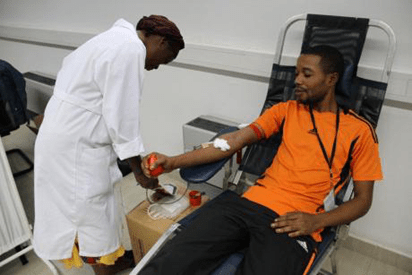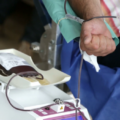Tattoo, a Polynesian word meaning ‘to mark’, is a form of body modification done by inserting indelible ink into the dermis to change its pigmentation. Tattoos are done for social, cultural, and religious purposes. It has been in existence since the 18th century and was associated with sailors, lower class individuals, and criminals. However, since the late 20th century, tattooing has undergone a redefinition and shifted to an acceptable form of expression all over the world, including Nigeria, cutting across almost all age groups and socioeconomic class.
Can Someone With Tattoo Donate Blood In Nigeria
Blood transfusion saves lives and improves health, but many patients requiring transfusion do not have timely access to safe blood. Providing safe and adequate blood should be an integral part of every country’s national health care policy and infrastructure.
WHO recommends that all activities related to blood collection, testing, processing, storage and distribution be coordinated at the national level through effective organization and integrated blood supply networks. The national blood system should be governed by national blood policy and legislative framework to promote uniform implementation of standards and consistency in the quality and safety of blood and blood products.
The discussion as to whether those with tattoos in Nigeria can safely donate blood has been raging for a while. The National blood transfusion service regulates blood donation in Nigeria, and the agency does not discriminate against Nigerians with tattoo willing to donate blood. This is because culturally, body marks similar to tattoos are very common in Nigeria.
African tribes are still seen with tattoos on their body. Available in different designs and form. This helps them to recognize people of their group and also those that belong to other groups.
Studies have shown that the main sources of blood procurement are commercial (remunerated) blood donors, voluntary donors, and replacement donors. A commercial blood donor offers a unit of blood for a fee paid by a contracted hospital vendor. A replacement blood donor is a family member or relative of a patient, donating a unit of blood to be used for a specific patient, while a voluntary blood donor is a well-meaning member of the society who donates his or her blood without any inducement for use by a recipient not known to him or her.
There is a general policy on blood screening before utilization in which a donor blood is screened for transmissible viral pathogens to ensure that only safe blood is transfused.
Blood is usually screened for hepatitis, a type of liver inflammation. Hepatitis B and hepatitis C are highly contagious and potentially deadly, especially for people with serious health issues.
A person can contract these forms of hepatitis after coming into contact with blood that contains it. This may occur during or as a result of blood donation. It can take up to 6 months for a person to develop symptoms of hepatitis after exposure.
Other regulations
The limitations on who can donate blood and when are in place to help protect recipients from potentially dangerous diseases.
People who need blood transfusions may already be very sick, and contracting a contagious disease could kill them. Regulations also protect blood donors. Some people, such as those with anemia, could experience adverse symptoms from donating blood.
Some limitations on donating blood in the Nigeria include:
Infections. People with symptoms of an infection should seek treatment for the infection before donating blood.
Bleeding disorder. People with certain bleeding disorders may not be able to safely donate blood.
Blood transfusion. People who have had a blood transfusion must wait for a specific period before donating blood.
Creutzfeldt-Jakob disease. People with Creutzfeldt-Jakob disease or a similar condition cannot donate blood.
Men who have sex with men. Homosexuality is illegal in Nigeria as a result men who have sex with men regardless of their sexual orientation or identity cannot donate blood.
Ebola virus. People who have ever had Ebola cannot donate blood.
Hepatitis. People who have or who have ever had hepatitis B or C cannot donate blood. People who live or have sex with a person who has hepatitis must wait 12 months before donating.
HIV. People with HIV or AIDS, and those who have ever had a positive HIV test, should not donate blood. People at high risk of HIV should discuss their risk with the blood donation center’s health historian to determine whether or not they can donate blood.
Intravenous (IV) drug use. People who have ever used recreational IV drugs cannot donate blood.
Travel. People who have traveled to countries where certain diseases are prevalent may also have to wait to donate blood. For example, following travel to a high risk country for malaria, a person must wait 12 months before donating blood.
Organ and tissue transplants. Organ recipients must wait a year before donating blood.
Piercings. Some organizations in Nigeria may not receive blood donations from people with piercings. Nevertheless, It is safe to donate blood after getting a piercing, as long as the needles were sterile and the piercing did not involve a piercing gun.
Sexually transmitted infections. People with gonorrhea or syphilis must wait 12 months after treatment to donate blood. Chlamydia, herpes, human papillomavirus, and genital warts do not prohibit donation.
Sickle cell disease. People with sickle cell disease cannot donate blood, but those with sickle cell trait may.
Tuberculosis. People with active tuberculosis should not donate blood until the infection is gone.
Zika virus. A person should wait 120 days after the symptoms of Zika disappear to donate blood. SEE: How Much Is A Pint Of Blood?
Health Benefits Of Donating Blood
Blood donation not only makes the receiver’s life good but also helps the donor to maintain good health. The health benefits of donating blood are mentioned below.
Prevents Hemochromatosis
Health benefits of blood donation include reduced risk of hemochromatosis. Hemochromatosis is a health condition that arises due to excess absorption of iron by the body. This may be inherited or may be caused due to alcoholism, anemia or other disorders. Regular blood donation may help in reducing iron overload. Make sure that the donor meets the standard blood donation eligibility criteria.
Anti-Cancer Benefits
Blood donation helps in lowering the risk of cancer. By donating blood, the iron stores in the body are maintained at healthy levels. A reduction in the iron level in the body is linked with low cancer risk.
Maintains Healthy Heart & Liver
Blood donation is beneficial in reducing the risk of heart and liver ailments caused by the iron overload in the body. Intake of iron-rich diet may increase the iron levels in the body, and since only limited proportions can be absorbed, excess iron gets stored in heart, liver, and pancreas. This, in turn, increases the risk of cirrhosis, liver failure, damage to the pancreas, and heart abnormalities like irregular heart rhythms. Blood donation helps in maintaining the iron levels and reduces the risk of various health ailments.
Weight Loss
Regular blood donation reduces the weight of the donors. This is helpful to those who are obese and are at higher risk of cardiovascular diseases and other health disorders. However, blood donation should not be very frequent and you may consult your doctor before donating blood to avoid any health issues.
Stimulates Blood Cell Production
After donating blood, the body works to replenish the blood loss. This stimulates the production of new blood cells and in turn, helps in maintaining good health.
Blood Donation Process
It is always good to plan blood donation in advance. Consult your doctor before donating blood if there are any health issues or concerns. It is always good to have healthy diet weeks before the donation. On the day of donation, make sure you are well hydrated, so keep drinking plenty of fluids. One should wear comfortable clothes during the donation process. In case you are undergoing any treatment or medication, it is advisable to inform the blood bank/clinic/hospital where you are donating blood. SEE: Can Diabetics Donate Blood In The United Kingdom







